So let’s encourage bicycling, especially now.
Why not encourage cycling during the coronavirus lockdown?
Bikes allows people to maintain isolation but provide important respite from being indoors
Cycling for everyday transport has not so far been restricted outside places which have imposed hugely draconian containment measures, like China. While Italy and Spain have placed temporary bans on leisure cycling, riding a bike for permitted everyday travel is officially allowed, albeit with reports of some over-zealous police enforcement.
On Thursday, the chief executive of British Cycling, Julie Harrington, wrote to the health secretary, Matt Hancock, urging ministers to add cycling to their list of recommended activities during the outbreak.
Earlier this week, a group of nearly 50 academics and experts on public health and transport wrote an open letter to the government, urging ministers to not discourage walking and cycling amid the pandemic, noting their vital importance in the wider public health issue of combating inactivity.
Read about it~





/cdn.vox-cdn.com/uploads/chorus_image/image/46776808/GettyImages-458043382.0.0.jpg?w=525&ssl=1)

